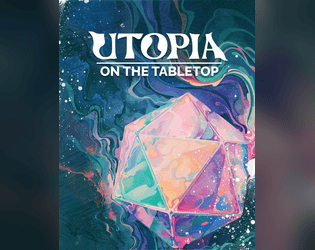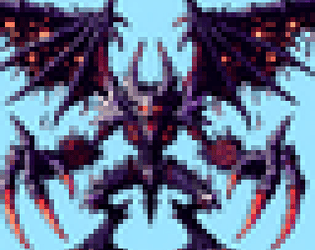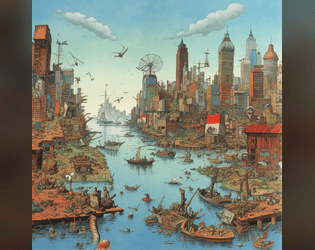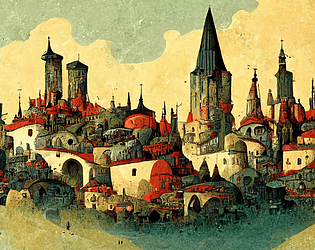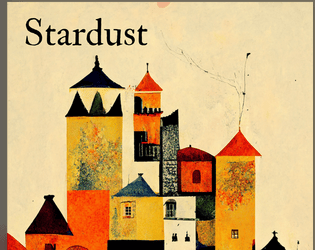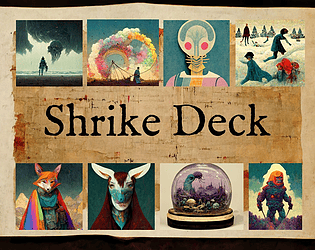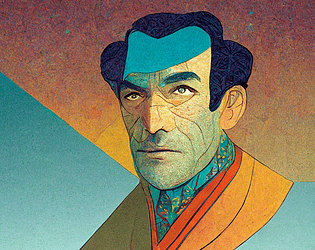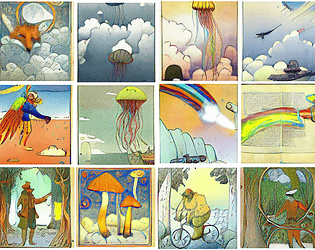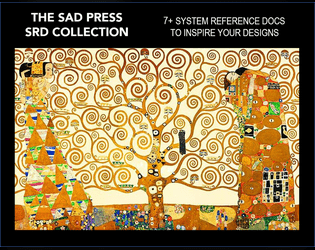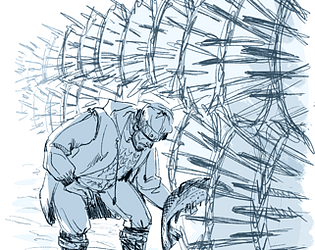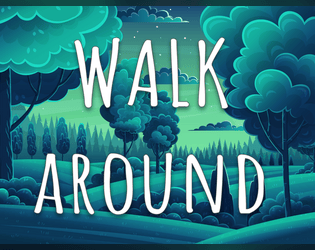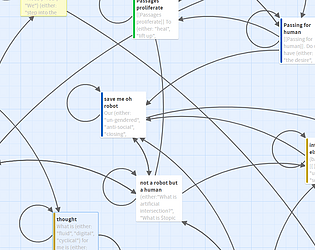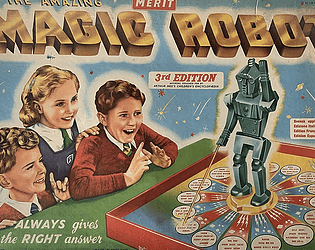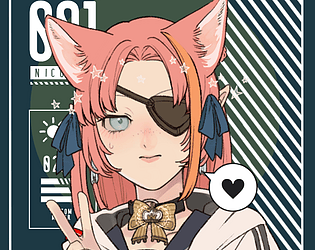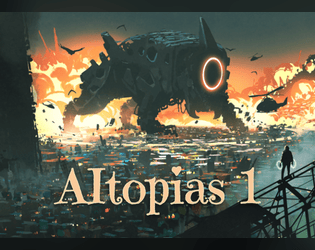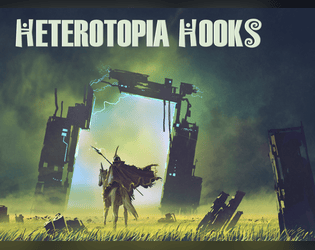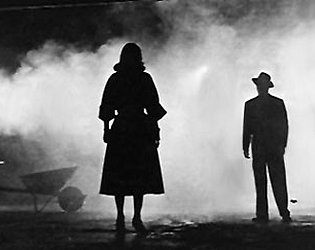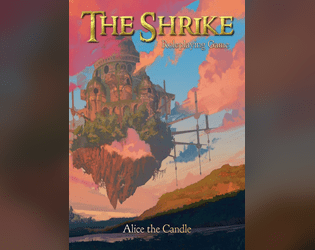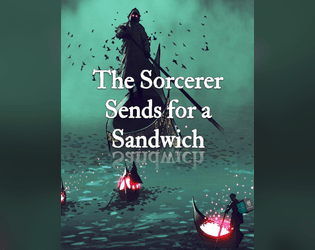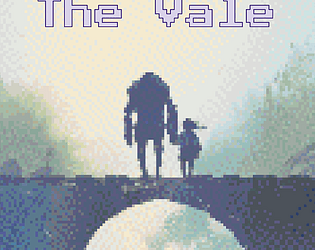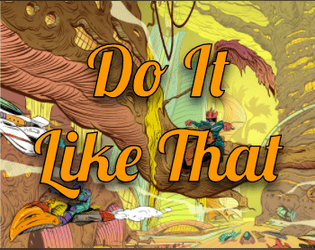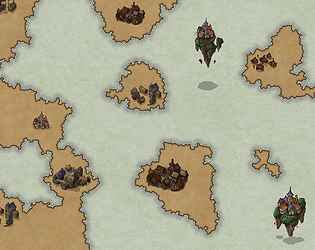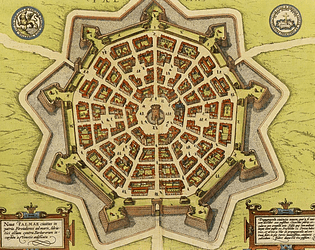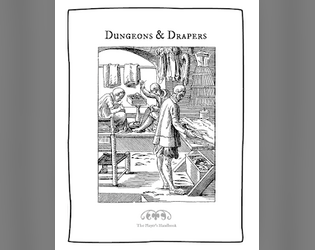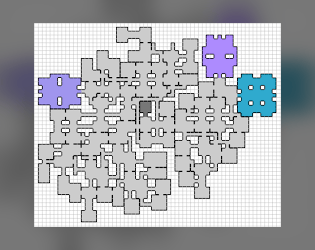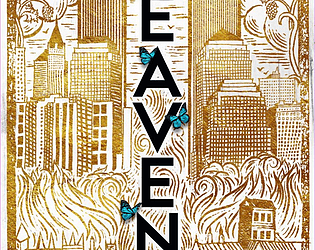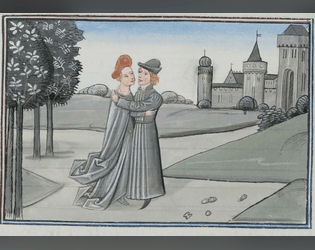here! https://sadpress.itch.io/the-shrike (community copies available)
sadpress
Creator of
Recent community posts
It was just the letter case - I had ".jpg" but the files had all been exported as ".JPG".
(Somebody on another a forum helped me out - they pointed out that if it was working on my computer but not on any host (I tried Itch and another one), then it was very likely a case thing, since Windows typically isn't case sensitive. That's when I noticed I didn't have my file extensions switched on!)
Thanks for your help!
Thanks! - I have been through the list and I don't think it's any of those?
I just tried starting from scratch, creating a JS file in a text editor, but I'm still having the same issue. It works locally but not when I upload it.
I've also temporarily set it to download the zip file instead, so at least it's not showing the broken link.
The contents of index.html is this (except with 55 images, not just 6):
<html>
<head>
<SCRIPT LANGUAGE="JavaScript">
<!-- Begin
var theImages = new Array()
theImages[0] = 'Slide1.jpg'
theImages[1] = 'Slide2.jpg'
theImages[2] = 'Slide3.jpg'
theImages[3] = 'Slide4.jpg'
theImages[4] = 'Slide5.jpg'
theImages[5] = 'Slide6.jpg'
var j = 0
var p = theImages.length;
var preBuffer = new Array()
for (i = 0; i < p; i++){
preBuffer[i] = new Image()
preBuffer[i].src = theImages[i]
}
var whichImage = Math.round(Math.random()*(p-1));
function showImage(){
document.write('<img src="'+theImages[whichImage]+'" width="540" height="720">');
}
// End -->
</script>
</head>
<body>
<input type="button" value="Draw Again" onClick="window.location.reload(true)">
<br/>
<script language="JavaScript">
<!-- Begin
showImage();
// End -->
</script>
</body>
</html>
More info, in case it's helpful:
If I copy the image address I get something like "v6p9d9t4.ssl.hwcdn.net/html/6337620/Images/Slide15.jpg" and when I try to access it directly, I get this message:
This XML file does not appear to have any style information associated with it. The document tree is shown below.
<Error>
<Code>AccessDenied</Code>
<Message>Access denied.</Message>
<Details>Anonymous caller does not have storage.objects.get access to the Google Cloud Storage object.</Details>
</Error>
Thank you!
I have a html file called index.html, and a folder called Images. They're zipped and uploaded, but the images don't display.
https://sadpress.itch.io/shrike-deck
It works fine when I test it locally, but not when it's uploaded to Itch.
Any ideas?
The zip is only 13MB, and there are only about fifty images in the Images folder.
Thank you!!
Hey,
Thanks so much for sharing this, I really enjoyed checking it out. It feels amazingly polished and thoughtful.
I like the Role + Method approach to character generation, and the fact that playbooks are permeable and swappable over time. The Organization Moves are great.
One really minor thing - will the hard move / soft move thing make sense to Guides who haven’t got much PbtA experience? Might they be wondering, “Which of these are the hard moves or soft moves … or maybe each exists in a hard and soft version?” Could an extra sentence or two clarify.
Thank you again for sharing!
Thank you for this! This is really cool, and in some ways this feels like a kind of post-police game? I really like how the communities maintain their autonomy even in the midst of problems, and the harmonists are mostly there to support. It feels like a very rare thing, when the norm for most games is to swoop in and be the heroes and saviours.
You mentioned not having time to find people to review this -- the English seems almost perfect to me. The only thing I noticed: for some reason in English even when “they” is singular you use the plural form of the verb. So it should be “They describe” (not “They describes”) and “Where do they come from” (not “Where does they come from”) and “Why do they care so much” (not “Why does they care so much”).
Thank you again for sharing.
Thank you for sharing this! Also thank you for sharing work-in-progress: it is nice to be able to offer feedback when it has more of a chance of being useful.
* I really like what you’re doing here. I like the idea of being able to play the same archetype incarnated in lots of different eras. This feels like a great way to tell a big story and make it intimate, exciting, memorable. I can imagine enjoying (especially by the third or fourth incarnation) coming up with distinctive and unusual versions of the archetype that defy expectations.
* My hunch is that the game will come together beautifully if it can give the players prompts and mechanical support to tie together the big picture with the individual stories. From the example prompts, I wonder if the players might need more support to ‘zoom in’ to a specific concrete scene?
* The lists of suggested “looks” are evocative, but to me they didn’t yell “this archetype spans thousands of years” yet. Maybe it’s a matter of expanding the lists, including fragments of various time periods and speculative societies?
And maybe even including one-or-two things that feel a bit arbitrary and random (and poetic), to challenge your players’ imaginations? Why would the Facilitator be wearing a crystal kilt? What do the Mender’s multicolored seeds do? Why does the Automaton have chest-mounted printing press? Etc.
It’s tricky of course: you want a balance between tapping into things your players already know about, yet not limiting the kinds of futures they could dream up. In the looks list, you could consider including made-up words to create even more openness, e.g. “A device called a yumur (what does it do?).”
* Nitpick: “effect change” (even though the verb form is usually affect).
* In its current form, I am still a little confused about the flow of play. Say there are four players. Does that mean we do four scenes in Stage 1, then four epilogues, then move to Stage 2? Or do we do six scenes, with two players going twice? Does the game always have 25 scenes? Is there support / encouragement for characters to step into each others’ scenes?
* I like this mechanic:
“The person to your right then answers the cost of the other choice not being focused on. What are the consequences? How does this also change your world? [...] Alternatively, the next player can choose to answer the unanswered Prompt, and not choose a Prompt on their turn.”
* This may be melodramatic, but maybe you should keep an open mind about the ‘succession’ keywords associated with each phase! It is of course cool and in some ways the core of the game. But in other ways the game could work perfectly well without it, and you might find you prefer the flexibility to write the prompts, without the constraints of the succession phases. Also, is there a risk that players might feel like they have to respond literally to each keyword?
You could always secretly keep the keywords as inspiration to help with your prompt-writing, but omit them from the game itself. (But idk; maybe the keyword correlated version will go swell!).
* Can migration be presented more positively? Clash, collaborate, and transform each other for the better?
* Have you decided yet how Society and Environment will be used? Presumably they will influence the prompts for the final part of the game? Maybe with some randomness added in?
Thank you again for sharing your creation, and good luck with developing it further!
Thanks so much for this. I really enjoyed reading it. The visual design is gorgeous.
What a cool setting too. I like the image of walking the chain from one Moon Rock to the next … and the various Triggers and Scene Starters. For a five-page TTRPG it is bursting with ideas.
Fwiw, here is some feedback. It is mostly very minor stuff to do with word choice …
“The Lore is abnormal but casually drafted with a lot of blanks for you to fill.”
I don’t quite understand why the Lore is “abnormal”? Maybe you could go for something like … "The Lore contains a lot of negative space for you to fill in" or "The Lore is casual and flexible, with the expectation that you'll adapt it" or "The Lore is to inspire you, and contains a lot of blanks for you to fill"!
“Choose and discuss the Shift”
Consider “Choose one or more causes and discuss the Shift”?
“Climate change”
Climate change is happening already, so consider “Extreme climate change” or “Climate change cascades”?
“Before diving into the havens, advert a Dystopian trait:”
I think the word “select” would be better than “advert”?
“In fact, some Moon Rocks were never stepped by other people than Skyfolk.”
Should be > “In fact, some Moon Rocks have never been stepped on by people other than Skyfolk.”
“each Haven has it’s own identity”
> “each Haven has its own identity” (i.e. remove apostrophe)
“After your path came across, they disappear for good.”
> “After your paths cross, they disappear for good.”
“Aerostate” > should this be “aerostat”?
“what system did you hacked without consent?”
> “what system did you hack without consent?”
“how does the aerostate floats?”
> “how does the aerostat float?”
Thanks so much for sharing!
Thanks for this. There are some beautiful and haunting images here. I like how the Twitter feed kind of becomes the (elongating) tower of light. The conceit of the ruined world of light feels really compelling, perhaps because it goes against the grain of the archaeological as whatever is most weighty, monumental, durable …
Detailed, procedurally generated prompts for storytelling is a really interesting space. (I was playing around with it in https://sadpress.itch.io/the-shrike-rpg, although I think I mostly learned what not to do). I wonder the extent to which you could get a Twitter bot to act as a kind of GM? Cheapbotsdonequick does allow keyword recognition easily enough …
Thank so much for sharing, and I hope that the larger project continues to develop as well!
Hi,
Thanks so much for this. I think it’s great - lucidly written, with clear and elegant mechanics, and fun and intriguing factions. I like the way you imagine ecological catastrophe on a galactic scale, and how you merge solarpunk / utopian themes with a pulpy sword & planet energy.
I would be interested to see what game dynamics emerge in practice. It seems like the game is trying to create a space for fragile collaboration, where the spectre of betrayal hovers over everything.
I also wonder whether the game dynamics would be influenced by the faction descriptions, especially if they embody different values and visions of the future. Perhaps a player might feel satisfied with solutions which disadvantage them in mechanical terms, if those solutions feel cohesive with their particular vision of the Verdant Moon should develop?
Thank you for sharing!
Thank you so much for this! -- a really great hack of a really great system. If you are interested in revisiting it, I have one or two suggestions, but if not I think it is already splendid as it is.
“If none of yout dice succeed, it goes wrong”
Typo, should be: “If none of your dice succeed, it goes wrong”
“No remedies (you only have enough to take care of a person if they get hurt)”
Could be a little confusing - perhaps ““No remedies (you can’t take care of a person if they get hurt)” or “No remedies (you only have enough to take care of one person if they get hurt)”?
“AJUDANDO” > “HELPING”
I like the adventure generating table. (1296 options, right?!)
On the first roll: “Infiltrated dealers” > I am not sure what this means exactly. Corrupt traders? Drug cartels? Disguised criminals?
I also wonder about #5 (“catastrophic climate / environmental event”) -- I like having it in the table, but it requires the players to interpret the outcomes quite loosely (“a wildfire wants to destroy the village in the forest,” “a famine wants to empower the Secret Project” etc.). You could consider replacing “WANTS TO” with “IS ABOUT TO.” But I’m not sure!
Are #1 and #3 a bit similar? Maybe you could create more options like this …
1. Raiders, pirates, militia, kidnappers
2. Androids, drones, robo-dogs, robo-dinos
3. ?
4. Loggers, miners, poachers, drilling rig crews
5. Fanatics, zealots, cultists, extremists, missionaries
6. Wildfires, floods, storms, climate catastrophe
#3 could be ‘Green Network internal saboteurs and spies’ or ‘Footsoldiers of a warlike forest city’ or ‘Scientists, engineers, explorers’ or ‘Capitalism revivalist faction’?
For the second roll (verbs), “Build / Synthesize” feel quite similar. Maybe it could be “Create / Modify” or “Create / Repair”?
5. Build / Synthesize
(Finally, I also have a more philosophical question: are reason & emotion truly so different? Isn’t emotion sometimes more reasonable than so-called reason? Doesn’t reason delight, drive, depress, derange or sharpen the senses, just like emotion?)
Thank you again for sharing!
Thank you for this -- it’s such a fun and fruitful setting. As a free-form magic system, Amberwrighting is fantastic. I love that I could potentially play my 21st century self suddenly washed up from the Mists of Time, or play a dinosaur riding on another dinosaur (or presumably a little dinosaur riding on a human), or an auroch ambassador in a raptor mech strider. The Egg-Tender role is really intriguing as well, and vaguely reminded me of Charlotte Perkins Gilman’s Herland, and a society where care and parenting are central to what people value and who they respect and listen to. (Problematic work in other ways, iirc ...)
I like the collaborative worldbuilding; the kind of rotating-GM mechanic; the way each neighborhood is rooted in a ‘heart’ NPC; and the roll-3d20-keep-two thing for Crises and Renewals.
Thank you for sharing!
Thanks so much for this! This looks like a nifty simulator of ecologically risky growth, with some clever and elegant mechanics. I wonder if it might give some of the feel of a multiplayer game, even as a solo game, because of the way you take turns with each township.
I also really like the “at least” in “Give back at least as many points.” I wonder if you’d consider squeezing in a Gift option e.g. “4. Alternatively, take no points, but transfer as many points as you like to another Township.”
It reminds me a little bit of Eurogames like Near and Far or Scythe (the engine-building aspect), which also involve a fair bit of state tracking admin. Both those games include narrative prompts (encounters), which helps to vary the texture a bit -- you likewise have the Random Event Card Theme. I wondered if these prompts could be more substantial? -- but maybe you prefer the abstract, stripped back vibe with plenty of negative space for the players.
I wasn’t sure where you can Develop -- is it just hexes adjacent to the township, or hexes adjacent to township / other developed hexes, or even anywhere?
Thank you for sharing!
Thanks so much for this! I like the mix of questions inviting you to develop your character, versus those more focused on the Ideal and the ecosystem of the island. And I like the theme of interspecies flourishing. Some of the questions I especially liked included:
What did somebody say to you that made you feel welcome in the Ideal?
Something living here seems to want to adopt you as a pet. What did you do that made you seem so approachable?
Describe what you created that makes you all feel better even though it has no practical use.
I have played For the Queen (once) and my group all had quite different experiences. One player struggled a bit because she felt like the game was aimed at fans of fantasy, and that she lacked the genre knowledge necessary to play properly. I wonder how that might apply to more exploratory games that seek to imagine new forms of living, games where by definition we all lack ‘genre knowledge’?
I suppose that is an overly stark way of putting it, and actually what is being accomplished in the Ideal — in terms of living in concert with nature, and perhaps also more just forms of social organization — is not actually completely new, just much rarer than it should be. That doesn’t make it any less significant or any less radical. So perhaps the challenge for the designer is to devise questions capable of gathering up that scattered, fragmentary and marginalized knowledge.
I wondered a bit about “leadership” in the prompts, and whether there could be one or two that nudged players to think about decision-making in the Ideal. E.g. “What strange democratic ritual have they adopted in the Ideal?” or something like that. I’m partly interested in that because it might open up new angles on the animals and plants too. I think making kin with the more-than-human must involve not just reverence for but also a kind of deliberation with the natural world.
Thanks again for this! I hope I get a chance to actually play it some time ;)
Thanks for this -- I think it’s great! Really compact and elegant, with a sort of gentle humour underlying it. I love how much world you manage to build in so few pages.
I feel like it’s the kind of game that easily accommodates episodic, one-adventure-to-the-next style play, while also developing longer arcs, recurring characters, sites, and communities, etc. If I were GMing it I think I’d want to introduce some political intrigue back at HQ, and maybe put the players in some dilemmas where they need to bend or break the rules.
Feedback and suggestions, fwiw:
Sentence isn’t finished > “5 A plague has broken out among the buffalo. Separate the “
“Roll d4 for a Threat” > should be d6
Consider “Your job is to help and protect those who are rebuilding the New World.”
Or consider something like “Your job is to help and protect those who are restoring the Great Plains shortgrass prairie” > I like the utopian vibes of new world, but it also potentially centres a European settler colonist perspective, right? https://en.wikipedia.org/wiki/New_World
Consider specifying (at least once) green hydrogen (blue hydrogen is a fossil fuel, and there are greenwashers out there who are being tactically vague about this) …
Very nitpicky but there are a few full stops missing.
I felt like you could cram a few more possibilities into the “Twist” table? E.g.
1 Extreme weather! Prairie fire, tornado, blizzard …
2 Airship trouble! Engine, gas leak, navigation …
3 Wildlife event! Buffalo stampede, bird strike …
4 Ambush! Rollers, zealots, HDF, poachers …
5 Distress call! Windjack, Sodbuilder, Tourist …
6 Call from HQ! A new policy or assignment …
I wondered if there was a place you could squeeze in one or two rationales for the restoration, especially the fact that biodiverse prairie makes an excellent carbon sink (which is still not very widely known, I think -- people tend to think it has to be all about planting trees)? But I can’t see an obvious place to put it. You could do it implicitly, e.g.
Science: Soil Carbon Probe, Portable Lab, Radiation Suit, Hazmat Suit
Or make it roll 1d8 for a Mission:
7 Someone’s gone missing. Lead the search.
8 Escort a Carbon Fraud Investigator to a site test.
Or maybe:
“As Prairie Recovery Agents of the US Department of the Interior, you have the following duties:
• Protect biodiversity and prevent wildfire carbon emissions.
• Investigate potential threats to habitats and ecosystems.
• Assist the scientists and engineers rebuilding the Great Plains.
• Provide emergency aid to any travelers in the Great Plains.
Basically, you are park rangers with zeppelins.”
Thank you for sharing!!
Thanks so much for this. The design is both beautiful and really distinctive. It has an alluring, disconcerting, somehow cinematic glossiness to it, which really jumps out compared to many of the other games.
I love that you explicitly address climate change and make it part of the set-up phase, and the conclusion. A lot of submissions seem only to talk about climate change in oblique ways (“ever since the Cataclysm” etc.).
The Authority options are interesting. I wasn’t totally sure how to interpret “Central” and “Regional.” Is the point that the area could be near to the centre of whatever power governs this territory, or it could be on the periphery of that territory? (I also wondered if you could showcase a greater variety of forms of governance. E.g. SYNDICATE, ELDERS, WORKERS’ COUNCIL, AI ALGOCRACY, DEMARCHY, CYBERSYNACY, DESPOT, CONTESTED, etc.? Or is the point more that this is just the name that people use for the Authority?)
I felt like I needed a little more clarity around some mechanics. I wasn’t sure what level everything starts at. I guess you have 1 point per facility? Could you really spell it out? There’s a little space on page 21 if that helps.
Minor typo: “able to take care of the mass influx of refugee” > refugees
Thank you for sharing this beautiful work!
Thanks so much for sharing this. Here’s a little fwiw feedback.
The premise and the rules all feel elegantly interconnected to me, and the game gives the impression of being neatly contained and yet richly generative (like a garden (even if the garden could be, like you say, the whole universe)).
I haven’t had a chance to actually play it, so ofc it’s only real playtesting that would reveal whether the rules are sufficiently clear, and the emergent dynamics support the kind of storytelling you’re going for.
It feels like there might be a lot to keep track of. How would you organise the information spatially? I wonder if some playbooks / character sheets / checklists might help to reinforce the rules, both in terms of learning them in the first place, and having something to look at to remind you as you play?
It is also really interesting to see a game that focuses so strongly on the theme of inside / outside, since themes of enclave, homeostasis, incursion etc. are so important in utopian writing and art. I really like the “Legitimize a Taboo” move.
“A Vagrant enters the Forest with 2 Damage.” Is Forest meant to be Garden?
I wasn’t completely sure I understood the Stained Dice mechanics. It might be good to mention them up front, e.g. “You will need a large number of d6s of two different colors (one for your Dice Pool, one for your Stained Dice)”? “This force is reflected in the game by Stained Dice, the second resource of Little Garden, which refresh at the start of every Turn” → So I guess that means if I have three Stained Dice, whether or not I roll them I will start the next Turn with three Stained Dice (unless they go up or down for some specified reason)?
“If a Wonder or other feature could not remove Damage, that thing is destroyed, lost forever.” This wasn’t completely clear to me. “Lowering Damage to 0” meaning destruction / death also felt a bit counterintuitive. Is there any reason not to call it Health or Resilience or Integrity or something?
Thank you for this! Some brief feedback, fwiw:
This is pretty incredible -- I haven’t read every single page, and also I hadn’t come across Lancer before (I’m glad I have now!) --but I can see it’s an incredibly rich and thoughtful and beguiling world you have imagined.
I like how it opens, and I like how it is often written from a relatively deep ‘in-world’ perspective, so it feels like communications which might really exist in the reality you’re conjuring up. But at the same time … I kind of missed a couple of simple, very straightforward introductory paragraphs, to clearly curate what this is, and give your reader a sense of how to orient themselves? If you decided to do this, it could also double as a pitch to hook readers who aren’t familiar with Lancer. You know, like, “Lancer is a tabletop RPG of optimistic space opera, where players take the role of elite mecha pilots. The Field Guide to Mfecane is an Africanfuturist homebrew supplement” etc.
Typo I think? “Unions DOJ/HR agents” should be “Union’s DOJ/HR agents”?
Idk if this might be (a) totally obvious or (b) totally irrelevant, but aspects of this supplement remind me of Iain M. Banks’s Culture novels, i.e. trying to make sense of a benign post-scarcity utopia that is also expansionist and actually kind of militaristic. On a bit more of a tangent, it also reminded me a bit of Vicky Osterweil’s In Defence of Looting, which is a non-fiction exploration of violence and positive social change.
Thank you again for sharing!!
Just wanted to say I really enjoyed this - I love the whole solarpunk plus cosmic horror premise, and the execution is filled with thoughtful details. I love the MENDERS acronym. The REKINDLE YOUR HOPE mechanic feels like it might work really well.
I know people do jams for different reasons, and some are happy to go with “I made a thing!” and move on, whereas others plan to keep iterating their games afterwards. In case you are interested in more feedback / ideas …
- I like the paradisiacal solarpunk communities surrounded by spooky wastelands. But I also like the idea of scars appearing IN the communities. “Evacuate District Meadowflowers-Four! Somebody call the MENDERS!” etc.
- The SENS are evocative and freaky, but could there be one or two more details to tie them to the premise of the game, i.e. the era of extractivism and environmental destruction lingering as eldritch entities? A SENS themed on oil spills, on nuclear meltdowns, on low-lying atolls sunken through sea level rise, child labor and cobalt mining, on pandemic sweeping through overcrowded refugee camps, on a carbon offsetting forest that burned down and released all its carbon into the atmosphere (the financial backers still got to keep their profits) etc. ...
- You could consider pointing players to books and movies featuring zones where the laws of nature are strangely altered. Jeff VanderMeer’s Annihilation series is excellent for that and very ecological (I’m guessing you may already know it). The Strugatsky Brothers’ Roadside Picnic and M. John Harrison’s Nova Swing are also great. & obv loads more: https://tvtropes.org/pmwiki/pmwiki.php/EldritchLocation/Literature
- “Only once, to a max total of 2d6.” So 2d6 is the max I can roll, even if I’ve got a relevant Item, a Role, and somebody helping? Or does the help put me up to 3d6?
Thank you again for participating,
By the way, thanks for sharing this as well! - really cool and I love the premise and the fact that you can play it with just a pack of cards. I also really like how abstract it is, yet carries a kind of radical politics in a quiet way. I haven’t had a chance to play it but it feels like it might have strategic depth plus a nice kind of “Are we telepathic?” vibe.
I was wondering if there might be less hierarchical ways of describing the two roles, maybe? Although I haven’t really come up with any good suggestions. Maybe “Community” supplying the resources and “Planners / Workers / Activists” making the sets, or something like that?
It would be a totally different game, but it could be cool to have a version where you lay down a border of cards face up, and the card values are somehow integrated into the puzzle of dismantling the border?
Love the idea you mentioned in your comment of some kind of Augusto Boal / Paulo Freire jam too.
Thanks so much for this. I love those cherry-bright shrimp. Playing as an assemblage of ship and crew definitely sounds like a lot of fun. Some of the writing and worldbuilding is absolutely gorgeous.
I’ve only read it, not played it! -- but fwiw here’s a little feedback.
It was a little crunchier and more mechanically intricate than I expected, given the theme and the “rules-light” description. I think I expected something like Carta SRD or The Quiet Year.
Some aspects of this moderate complexity feel more cohesive with the tone and feel than others. Grinding for resources and investing them in improvements, and unlocking skills on the skill trees, feel like they might be cozy and satisfying.
On the other hand, I think sometimes I hankered either for greater simplicity, and/or for more clarity (especially signposting and organisational clarity). I wonder if you’ve had the chance to check out a playtest from behind a veil of silence, without giving the players guidance yourself?
For example, consider subheadings. I also wonder if it could benefit from a one-page “Getting Started” section that players could follow like a checklist on their first session, which clearly identifies the core mechanic from which the fiction will arise? If I hunt around I can see that there are moves, and tasks for experience, and campaign ideas, and a method for generating random resource drops, and a random event oracle, and a map that players / GM draw on, but I’m struggling a little to understand how it all flows together. I’m also not sure I figured out what counts as a crewmember move … (some example play might be another option to consider, especially since you write so wonderfully).
For me, the ‘Basics of Gameplay’ section gets a little tangled up by considering the with-GM and without-GM options simultaneously. Consider splitting it into two sections, even if there’s a bit of redundancy across them?
The art, the mood, the setting, the vibes, are all utterly beautiful. This game includes is some of the most mesmerizing writing I have read across all the submissions to the jam.
Fwiw, this was absolutely one of my favorite games. Thank you again for sharing!
Typos:
Any player able to tell a joke that makes a GM or other play genuinely laugh > play / player
Thanks so much for this. The worldbuilding is rich, erudite and inspiring, and I love the way you fruitfully integrate the Tarot, the ancient Egyptian text, and the more science fictional imagery and tropes. The oblique and fragmentary character of the Admonitions is turned to advantage: the game sort of transforms the misty space between the present and past into the misty space between the present and future. I can hardly believe this is your first game! I hope you keep creating others.
I noticed one typo (stray apostrophe):
Finally, beyond the edge of society are the Horon’s
Hey,
Thanks so much for this submission to the Applied Hope jam - what a cool little zine, cramming in so much into so little space. I love the water pistol!
I wrote a thing called ‘In Praise of Smaller Actions’ which maybe you might be interested in:
https://medium.com/@jolindsaywalton/in-praise-of-smaller-actions-acfdbeface7f
Reducing emissions from data storage is such a complex topic - I’m trying to do some work on it, but it’s hard to know where to begin! “Delete emails” seems like the right mind-set, but are there more effective ways to start reducing your digital footprint?
I didn’t really understand this sentence? > “Nothing worth a watering can and some seeds.”
Maybe “Nothing better than a watering can and some seeds.”?? “All it takes is a watering can and some seeds”??
If you ever decide to edit it, I have one or two small suggestions to make it flow more smoothly in English:
Until the mixture have a consistution of a glue. > Until the mixture has the consistency of glue.
to be spreaded in order to awake the consciousness > to be spread in order to awaken the consciousness
The ecologic advices well known > Well-known ecological advice
repair instead of throw > repair instead of throwing away
turn off the electrical devices instead of put on stand by, put a sweater on instead of turn on the heating, wash your clothes at 30°C, isolate your house instead of replace your heating, always think before buying. > turn off electrical devices instead of putting them on stand by, put a sweater on instead of turning on the heating, wash your clothes at 30°C, insulate your house instead of replacing your heating, always think before buying.
Ecologie advices less known > Lesser-known ecological advice
It's the most ecological gesture, much more than stop using his car. > It’s the most ecological gesture, much more than stopping using your car.
Each mail kept consume some energy. Delete them regularly. Avoid keeping docs in a Coud. > Each email kept consumes some energy. Delete them regularly. Avoid keeping docs in the Cloud.
Thanks again for sharing it!!
Thanks so much for this game. I love the premise of the community repair cafe that supposedly is there to fix physical things, but inevitably gets mixed up in complicated human (and more-than-human) affairs.
I don’t know for sure, but the stat set feels well-balanced? -- like each stat could feasibly get its time to shine, kind of thing.
The roll table feels like a really fruitful set of prompts. I love the balance between the concrete and the more abstract, and that between the specific and the more general. And also I’m just really into the overall tone and energy of the game.
There is an anthology of essays (Utopia on the Tabletop) that we're publishing later this year (if all goes well!). I’m not sure yet how much space we'll have for games as well, but if we do have space I’d love to include Sum of its Parts. If that’s something you might be interested in, I’ll get in touch some time next year with more details?
FEEDBACK + SUGGESTIONS
In the PDF some of the symbols haven’t come through properly, e.g. “Stats: 1♥/2▢/3▢/4▢”
“For example, if a player has a rank of 3♣ and plays the 5 of ♣, they would lose if they roll above 16 and win with any roll below that.” → Maybe this should say “16 or above”?
I think there’s some minor inconsistency in how the core resolution mechanic is described: is it success to roll above your bet, or success to roll equal or below your bet? I’m pretty sure it’s roll above to succeed: “If their bet is less than or equal to the roll, they succeed!” But then the example doesn’t seem to fit that.
My mental arithmetic is not good enough to have any sense of the probabilities of success or failure, or what it would actually feel like to play. It does feel like it *might* involve more work than necessary, i.e. there might be some other system you could use that would give you a similar ? But on the other hand, the potential for big numbers feels fun and cohesive with the spirit of the game. And the multiplication might even slow things down in a *good* way, conveying a sense of care and patience, which also feels like a great fit with the premise.
“Face Cards have a value of 11.” → Any reason not to use 10, like in Blackjack? Sometimes I think it’s just nice to adopt as many already widespread conventions as possible to give your players less to remember.
Prompt table seems really great. I wondered about maybe “Entrepreneur” for “Businessman,” as being gender-neutral and also maybe slightly more generative? You could also combine “Father” and “Mother” into “Parent” to make room for something else on that column. “A Computer / Communication Device / A Disc” felt like there might be a BIT of overlap? Could go with e.g. “A Digital Device / Data Storage” and make room for something else? Or “A Computer / A Message”? One very dramatic consolidation would be “Another Bard / Another Witch / Another Tinkerer / Another Hacker” to “Another Volunteer,” but I’m not sure about that one.
Ideas for things to add if you like any of them and could fit them in:
Patrons: A Refugee, A Repairer, A Campaigner, A Courier, A Nurse, A Scientist, An Exile
Problems needing fixing: A Message, Faith, A Friendship, An Heirloom, A Recipe, An Assistive Technology, A Recording Device, A System, A Plan, A Generator, A Map, A Disguise, An Expectation
Events: A Powercut, A Flood, A Storm, A Heatwave, A Blizzard, High Winds, A Shortage, A Wildfire
Thanks so much for this. Just a few stray thoughts.
One thing I love about this game, particularly in the context of the jam as a whole, is that it gives the player a relatively rich setting to work with. I think many designers, wanting to give players free rein to create radically different futures, understandably took a very light touch to worldbuilding. But the risk is that players feel unsupported or, when put on the spot, they reach for world elements that are fairly familiar. It’s About The Yearning knows what it’s about: it’s about cowhands on Mars!
I love “No two Martian weddings are alike” … both (a) succinctly inspiring players by rooting their imaginings in something familiar and rich, and giving them maximum permission to do anything with it, and (b) the way queerness has its special affinity for something to do with desire / love / romance / sex etc. while also potentially questioning and wobbling any norm whatsoever.
I like this: “Some of the work these cowhands do is illegal. Some of it is immoral. Some of it is legal but immoral, or illegal but moral. All of it is deeply personal to the cowhands doing the work.” It feels like for some players this game might turn into a framework for reflecting on the polarisation of US culture (and other cultures). How do people steeped in very different ideologies and ways of life attempt to understand each other deeply? And how do you dramatize such attempts without playing into glib centrist-liberal romanticizations of the power of “just listening to one another”? It doesn’t seem like the game offers an easy recipe or anything, but at least it brings together some weird and inspiring ingredients.
Is this a typo? It > its? “It a fun diversion,” your advisor says. “Just don’t lose sight of what’s important.”
Not sure, but … consider rewording the beginnings of some/all Bonus sections to bake in the “this is optional” vibe? E.g. Bonus: “Maybe on Mars, research is its own industry. At the bottom …” “For example, the first cowhand camp was established” “Is there marriage on Mars? Maybe there is, but it’s a funny thing” etc.?
Does it sometimes feel a little too complete? Do even the questions feel a little too complete in their openness, their wondering?
There is also the question of settler colonialism and the Old West. Is there a risk of the game being played as a I’m Not A Racist I Just Humor Racists Simulator?
Thank you for sharing this work!!!
A massive thank you to everybody who participated in the Applied Hope: Solarpunk & Utopias Game Jam. It was completely impossible to pick the prize-winners so we did it anyway. We hope everyone gets some kind of prize from somewhere.
We also hope folks will stick around and keep doing stuff like this. Some good spaces to find one another: The Utopia on the Tabletop Discord, other Discords like the FKR Collective, Sustainable Gaming Forum, DEV the Solution, Queer Indie TTRPG, Games for Change, Conjured Games, and Storytime RPG Discords, and the RPG Creation subreddit and Solarpunk subreddits. The jam runners are also on Twitter: @utopianplay (Jo) and @steina (Eric).
Drum roll, fanfare, elf-glitch bloops, hacked acoustic cello with on-body transducers, the Applied Hope: Solarpunk & Utopias prizes go to …
1) Best RPG Under Five Pages
subconscious_Routine by poorstudents
- Twitter: @poorstudentsRPG
- Itch: poorstudents.itch.io
subconscious_Routine is a one-page RPG about a team of bots complying with their code on an overgrown, post-post-apocalyptic Earth, exploring derelict infrastructure, helping animals and plants, and creating art. In your microchip ears the birds are still chirping, and you can listen to those songs evolve over centuries: “When all the bots take time to stop and reboot 1d6*10 years pass.” subconscious_Routine creates a mechanically rich space to explore the theme of freedom. Eventually you can transcend your programmed loop of actions entirely, but actually the discovery of free will starts earlier — through imagination, interpretation, and especially through collaboration and connections with others.
2) Best Solarpunk DIY Game
Scraps by Cezar Capacle
- Twitter: @capacle
- Itch: capacle.itch.io/
Scraps is a game about salvaging and crafting in a hopeful world, among the verdant ruins of ancient civilizations. It’s for one to four players, with mechanics partly inspired by the solo RPG Ironsworn, with a touch of Tetris / Battleships to keep things fresh and spicy. It asks you to change your mindset to suit a universe of symbiosis and harmony: to craft and to make, to transform the world around you, yet without asserting mastery and dominance.
3) The Lustrous Effervescing Fontanelle of Luminous Mutable Futures Award
It’s About the Yearning by Lonely Cryptid Media
- Twitter: @LonelyCryptid
- Itch: lonelycryptidmedia.itch.io
The jam had ‘hope’ in the title, but the games had all kinds of tones and moods. Sometimes it felt more like Applied Bittersweetness. Lonely Cryptid's It's About the Yearning is a string of vignettes of the dwindling days of cowhands on Mars. It’s a game about queer time. It’s also a game which invites you to worldbuild through the scarcely reliable format of the enthographic interview ... and to imagine intimate and often difficult conversations across very different worldviews and forms of lived experience.
4) Mx Congeniality
Moon Elves by Maik
- Twitter: @MaikMalaik
- Itch: maik-malaik.itch.io
Slip through the luminous lunarpunk forest, in the guises of elves-cum-descendants-of-crashed-astronauts. Moon Elves is inspired by the likes of Bogdanov's Red Star, Tarkovsky's Solaris and Zulawski's On the Silver Globe. Gorgeous velvety, ziney aesthetics. Rules-free. Wow.
5) The Applied Hope Fruiting Bodies Award
Roots & Flowers by The Gift of Gabes
- Twitter: @TheGiftOfGabes
- Itch: thegiftofdice.itch.io
Roots & Flowers is an elegant and compassionate RPG of solarpunk troubleshooting adventures, built on the salvaged chassis of John Harper’s Lasers & Feelings. The writing and design choices are deft and suggestive. Suggested “snacks,” “beverages,” and “a strong desire to take down capitalism, and all forms of oppression, bigotry, and environmental destruction.” Two pages of safety tools feels very substantial in a total of just eight pages, and it feels appropriate that a game like this should devote considerable space to thinking about its own edges: how it is knitted into the world, how like any game it is (borrowing game theorist Jasper Juul’s phrase) “half real” ... and how perhaps it might become a little more than half real?
6) The Best Adaptation Award
The Transition Year by Affinity Games
- Twitter: @GamesOfAffinity
- Itch: affinity-games.itch.io
After reading the Applied Hope entries, it felt like the most famous RPG of all time was no more Dungeons & Dragons — it was Avery Alder’s The Quiet Year. If you don’t know The Quiet Year, it’s a just breathtakingly beautiful game, all about community struggling to build and to cherish, in the slender isthmus between apocalypse and apocalypse. Affinity Games’s The Transition Year stays unabashedly close to its source material, but the many shifts and nudges show great sensitivity, thoughtfulness, and maybe even something that answers to our kinda grand title, “Applied Hope.” The Transition Year is a game of anarchist post-capitalism in shadow of the ruins of extractive infrastructure. We believe it also has the potential to be a challenging game, inviting players to explore some big themes in the interplay between individual, affinity groups, and wider collective community.
7) Best Game About Something Pretty Specific
Marvelous Mutations & Merry Musicians! by Wendi Yu
- Twitter: @wen_di_yu
- Itch: wendiy.itch.io/
MMMM! is a game where those extra swarms of fingers and tentacles will come in handy for shredding your big guitar solo, as you adventure across a prismatic landscape that is not so much ‘post’ apocalyptic as just, like, OVER it. A band of adventurers who really are a band, and perhaps a party that really is a party. Gorge aesthetics, with zany ziney collage glued up against RPG roll tables like some kind of meta-bricolage. This goes through the back end of Body Horror, and into Body Delight. Looks it would be really fun to play too.
Special Prize: Big Buzz Award
The Nurture by hannah j. gray
- Itch: hjgray.itch.io/the-nurture
One entry was chosen to get a special commissioned illustration by Ewerton Lua. In The Nurture, you cross perilous landscapes, helping scattered communities or fellow travellers. “THE NURTURE is primarily about helping, healing and making a difference one small act of kindness at a time. There won’t be huge heroic feats every session.” Oh yes AND YOU ARE A BEE.
Notes: The Green Agon and Climate Resilience awards felt hard to hand out, so they were renamed Best Adaptation and The Applied Hope Fruiting Bodies Award. The Best Solarpunk DIY Award was reinterpreted a bit from its original description. The Best Game About Something Very Specific Award became the Best Game About Something Pretty Specific because a band of mutants travelling around with magical instruments having adventures is only PRETTY specific. Folks who got a prize should be contacted in the next week-ish, or feel free to get in touch: j.c.walton@sussex.ac.uk / @jolwalton on Twitter.
Hi,
Just wanted to say thank you, and that I was really into this.
I like the central mechanic of the circular time track, and the way you can plant seeds (actual or metaphorical) that spring from future nodes (but can move around in the meanwhile).
I really like Greentongue!
I also like the examples of gameplay -- they really clarify and enliven things for me.
I’m really intrigued by the mention of Anna Tsing. The game reminded me a bit of the bit where the rhythms of mushroom finding-and-picking are likened to dancing.
From reading all the entries to the jam, it feels like one thing many designers are wrestling with is how to move beyond the machinic character of capitalism, the way capitalism invites us to see the whole universe as a collection of assets with merely numeric values. Some have been tempted to go very rules-lite and emphasise storytelling, which makes sense, but then I wonder if they may be foregoing some of the generative / transformative potential of play, and simply creating spaces to imagine what has been imagined before. I’d be interested to know how Circle Dance plays out in practice, especially things like the idea point mechanic.
Thank you so much for sharing!!!




